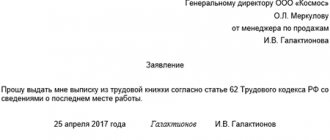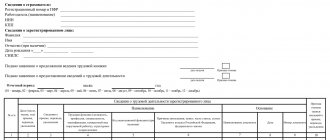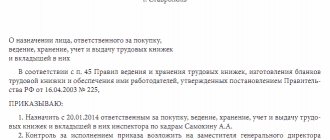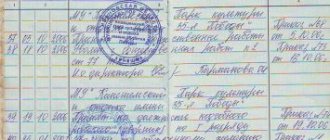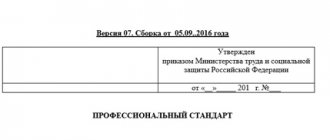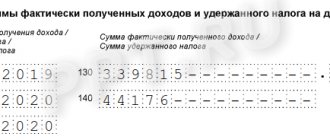What is an electronic work book?
An electronic work book is a digital analogue of a paper work book, which will display all the same information as in today's paper books.
With the exception of information about education and awards, they will not be available in the electronic version. All data on the labor activity of citizens will be collected in the information system of the Pension Fund, which began to be formed in 2020. To do this, employers will have to transfer to the Pension Fund all information about personnel changes.
All information on electronic work books in 15 minutes in our expert video:
https://youtu.be/MZ8k8tV9prk
What you need to know about electronic labor
Your employer must inform you in detail about the essence of the changes before June 30, 2020. Briefly they are as follows:
- For already working citizens, the transition to electronic labor is voluntary. For those who decide to acquire an electronic work record (and write such an application), the employer will hand over the paper book and will no longer be responsible for its storage. The last entry in the book will be like this.
- If you want to save the document in its traditional form, you also need to submit a corresponding application to the employer (in any form or on a form provided by the employee responsible for maintaining work records). Then the employer, along with the electronic book, will continue to enter information about work activities in the paper version.
- Those who get a job for the first time in 2021 will immediately have an electronic work record; no one will give them a paper one, even if they want to. Those applying for their first job in 2020 can still obtain a paper work permit.
- When applying for a job, an electronic work permit can be submitted to a new employer either in printed form or in electronic form with a digital signature. He will give it to you in the same form upon dismissal.
- There is no need to worry about the safety of electronic work record books. The Pension Fund guarantees a high level of security for its information systems. The foundation says it is virtually impossible for a failure or hack to result in data being altered or destroyed. Personal account information is recorded in distributed storage systems, which eliminates the risk of data loss.
Advantages of an electronic work book
An electronic work book, unlike a paper one, cannot be lost. A person will always be able to obtain up-to-date and reliable information about his work activity from the PFR information base. He will not have to make and certify copies of the digital work report for various authorities, plus it will become easier to get a job remotely.
Starting from 2021, employers will no longer have to create, maintain and store paper work books. An exception is cases when the employee did not want to give up paper. Then the employer will have to comply with both the old and new rules.
The choice is up to the employee
An application to maintain a work book in electronic form or to save a paper version must be submitted to the employer before December 31, 2020 . However, there may be exceptions where the employee has the right to submit it at any time. For example, if a person was on sick leave or on vacation, as well as if he was not employed at all.
If you issue an electronic book, the employee will be given a paper version with a record of the choice made. It will not lose its power and will be used on a par with the electronic one. It must be saved , as it contains information about work until 2020. They will not be in the electronic version.
When saving a paper work book, the employer will enter data simultaneously into two versions - electronic and paper. In the future, the employee will be able to submit an application and switch to the electronic format.
What will happen to paper work books?
After January 1, 2021, employers will issue paper work books to employees. But only to those who choose the electronic labor option and write a corresponding application before the end of 2020.
If an employee does not want to give up paper work, he will have both paper and electronic ones. Employers will continue to keep labor records on paper, and at the same time will submit information about all personnel changes to the Pension Fund information base. If this employee changes jobs, the new employer will also be required to continue to maintain his paper work record and keep it.
At any time, a person who left a paper work record will be able to write an application and switch only to the electronic version, then they will give him the old one.
only those who already have one or will get a job for the first time this year have the opportunity to keep a paper work record Starting from 2021, paper work records will no longer be issued for new employees, and those who get a job for the first time have no choice: there will only be a digital option.
In order for existing employees to know about the upcoming changes and their right to leave a paper work record, employers are required to notify them about this in writing, ask them to make a choice and write an application before the end of 2020. More details about this below in the step-by-step instructions on switching to ETC.
Electronic work books. Clear instructions on what to do in 2020
The entire year 2020 will be a transition period during which employers and employees must prepare for new realities.
On December 16, 2020, a law on maintaining electronic books was adopted (Article 2 of the Federal Law of December 16, 2020 N 439-FZ).
- Select an employee in your team who will be responsible for providing the Pension Fund with information about the work activities of employees and generating documents for them in electronic form.
- Information about the labor activities of employees will be compiled in the Pension Fund database. Check the information system in which the organization's personnel records are maintained. If reports to the Pension Fund of the Russian Federation are generated in these databases, then the names of positions and structural units in them must exactly correspond to employment contracts and employment orders. The names of positions and structural units should not contain Latin letters.
This work must begin in January 2020, since the new SZV-TD report will need to be submitted no later than February 15, 2020. When hiring workers in January 2020, transferring to another job or dismissing, you need to ensure that the job title and/or structural unit with the data specified in the employee’s TD and the employment order, so that incorrect data is not automatically uploaded to the report from the information system.
Check whether the order numbers in the 1C database correspond to the original orders on paper.

